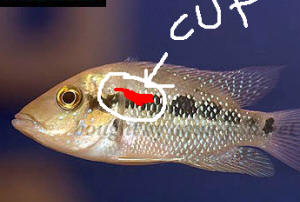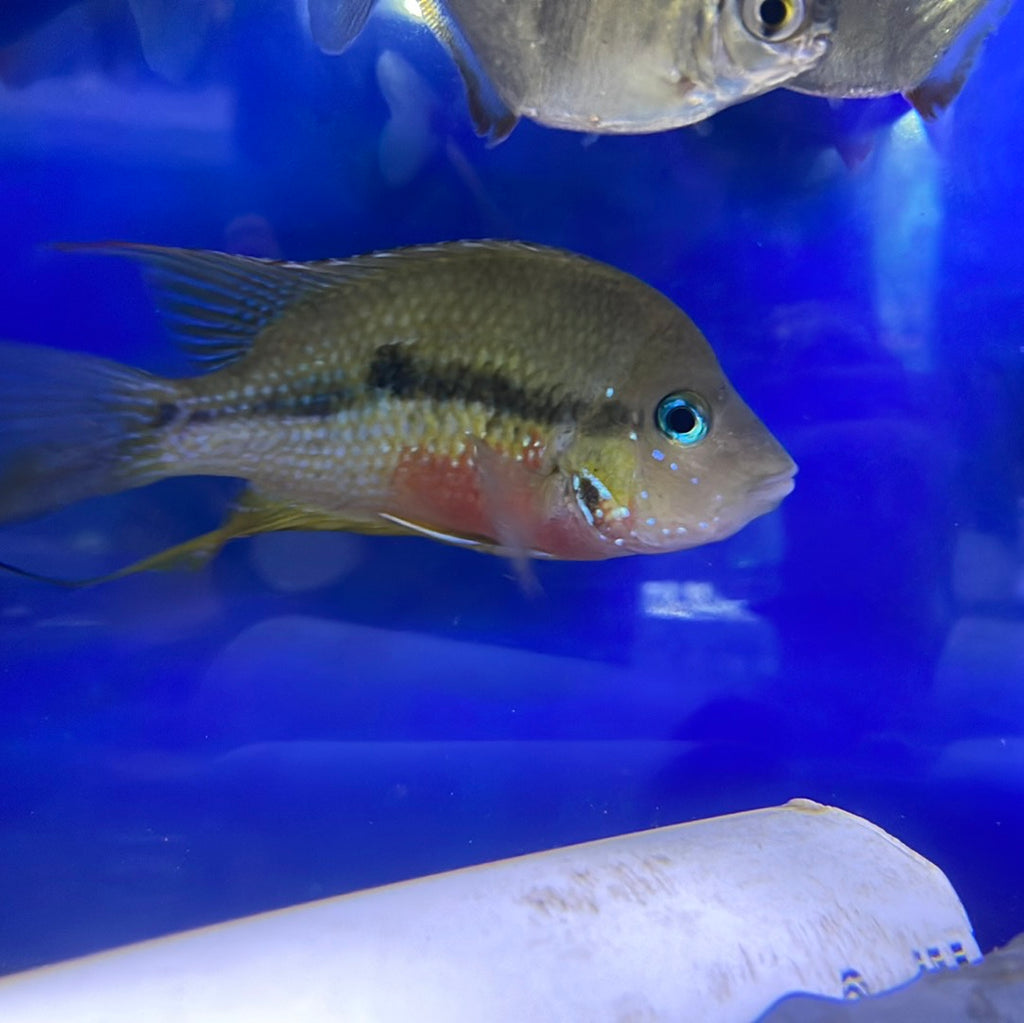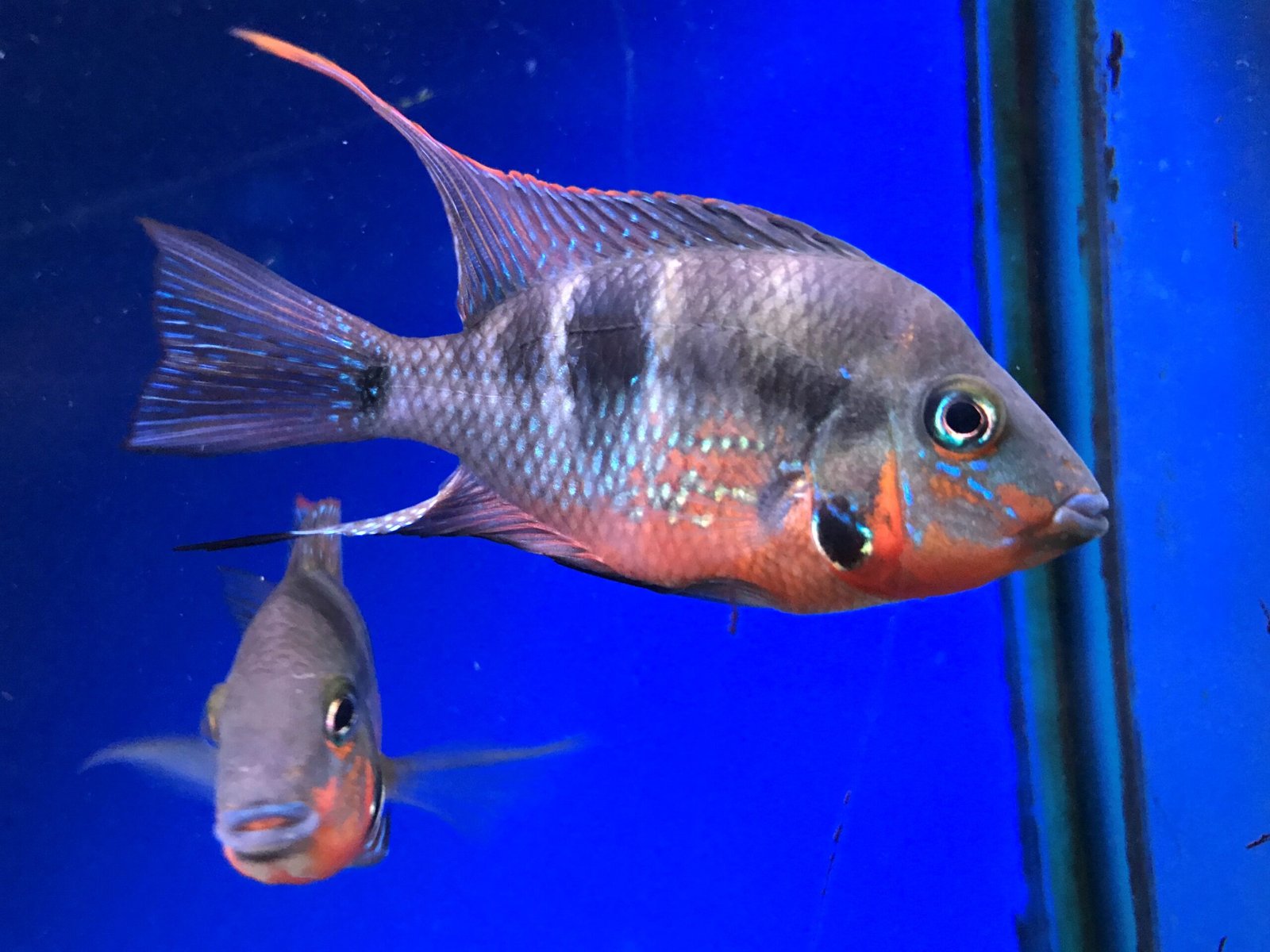Firemouth Cichlids often face health issues like ich, fin rot, and parasitic infections. Maintaining clean water and a balanced diet is crucial.
Firemouth Cichlids, known for their vibrant colors and fiery throats, are popular in home aquariums. These beautiful fish thrive in well-maintained environments but are susceptible to common health problems. Ich, a parasitic disease, often affects them, leading to white spots and irritation.
Fin rot, caused by bacteria, results in damaged fins and tail. Parasitic infections can also pose significant threats. Regular water changes, proper filtration, and a balanced diet can help prevent these issues. Observing any unusual behavior or physical changes in your Firemouth Cichlids can aid in early detection and treatment, ensuring their long-term health and vitality.
Common Health Issues
Firemouth Cichlids are beautiful fish, but they can get sick. Knowing the common health issues helps you keep them healthy. Below are some frequent health problems.
Ich Disease
Ich Disease is a common problem for Firemouth Cichlids. It is also called white spot disease. This disease shows up as tiny white spots on the fish’s body and fins. The fish may scratch against objects and seem restless.
- White spots on body and fins
- Fish scratch against objects
- Restless behavior
Ich Disease is caused by a parasite. You can treat it with special medicine. Keep the water clean to prevent it.
Fin Rot
Fin Rot makes the fins look torn and ragged. The edges of the fins may turn red or white. This disease is often due to poor water quality or injury.
- Fins look torn
- Red or white edges on fins
- Caused by poor water quality or injury
To treat Fin Rot, improve the water quality. Use antibiotics if needed. Check the tank for sharp objects that could hurt your fish.
Swim Bladder Disorder
Swim Bladder Disorder affects the fish’s ability to swim. The fish may float upside down or sink to the bottom. This disorder can be caused by overfeeding or a bacterial infection.
- Fish floats upside down
- Fish sinks to the bottom
- Caused by overfeeding or infection
To treat this, fast the fish for a day. Feed it peas to help clear its system. Keep the water clean and check for infections.

Credit: www.wetwebmedia.com
Signs Of Illness
Firemouth Cichlids are beautiful fish. Their health is crucial for their vibrant colors and lively behavior. Recognizing signs of illness early can save their lives. This section will help you spot these signs.
Behavioral Changes
Behavioral changes are the first indicators of illness. Watch for these signs:
- Lethargy: If your fish is less active, it may be sick.
- Erratic Swimming: Swimming in circles or upside down is a concern.
- Isolation: Staying away from other fish can signal illness.
- Scratching: Rubbing against objects indicates irritation or parasites.
Physical Symptoms
Physical symptoms are easier to spot. Look for these signs:
| Symptom | Description |
|---|---|
| Faded Colors | Colors become dull or pale. |
| Clamped Fins | Fins are held close to the body. |
| White Spots | Small white spots on the body or fins. |
| Bloated Body | Abdomen appears swollen. |
| Red Streaks | Red lines or sores on the body or fins. |
Appetite Loss
Appetite loss is a major sign of illness. Healthy Firemouth Cichlids are eager eaters. If your fish shows any of the following, it might be sick:
- Refusing Food: Ignoring food is a bad sign.
- Spitting Out Food: Taking food in but spitting it out indicates illness.
- Weight Loss: Noticeable weight loss suggests a problem.
Pay close attention to these signs. Early detection can make a big difference in your Firemouth Cichlid’s health.
Preventive Measures
Taking preventive measures ensures that your Firemouth Cichlids stay healthy. By focusing on water quality, proper diet, and tank maintenance, you can prevent many common health problems. Below are some essential tips.
Water Quality
Maintaining excellent water quality is crucial for Firemouth Cichlids. Poor water can lead to diseases. Ensure the water is always clean and well-filtered.
- Keep the water temperature between 75°F and 82°F.
- Maintain a pH level of 6.5 to 7.5.
- Test ammonia and nitrate levels regularly.
- Perform a 20% water change every week.
Proper Diet
A balanced diet keeps your Firemouth Cichlids healthy. Poor diet can weaken their immune system.
- Feed them high-quality flake or pellet food.
- Include live or frozen foods like brine shrimp.
- Offer a variety of foods to ensure balanced nutrition.
- Feed them twice a day, in small amounts.
Tank Maintenance
Regular tank maintenance helps prevent diseases. A clean tank provides a healthy environment.
- Clean the tank glass to prevent algae buildup.
- Vacuum the substrate to remove waste and uneaten food.
- Check and clean the filter once a month.
- Inspect decorations and plants for any dirt or debris.
| Factor | Optimal Range |
|---|---|
| Temperature | 75°F – 82°F |
| pH Level | 6.5 – 7.5 |
| Water Change | 20% weekly |

Credit: www.cabidigitallibrary.org
Treatment Methods
Firemouth Cichlids are beautiful fish, but they can have health problems. Knowing the right treatment methods is crucial. This section will discuss different ways to treat these problems. Let’s explore medication use, quarantine procedures, and natural remedies.
Medication Use
Using medication can help treat many fish diseases. Antibiotics are common for bacterial infections. Anti-parasitic drugs work well for parasites. Always follow the dosage instructions. Overdosing can harm your fish.
Medications come in different forms. You can find them as tablets, powders, or liquids. Some medications are added to the water. Others are mixed with fish food. Always read the label before using any medication.
Quarantine Procedures
Quarantining new fish is essential. It helps prevent the spread of disease. Use a separate tank for new or sick fish. This tank should be small and easy to clean.
Keep the quarantine tank at the right temperature and pH. Monitor the fish closely. Look for signs of disease. Treat any issues before moving the fish to the main tank. Quarantine should last at least two weeks.
Natural Remedies
Some prefer natural remedies to chemicals. Salt baths can treat many skin issues. Use aquarium salt, not table salt. Dissolve the salt in water before adding it to the tank.
Garlic juice is another natural remedy. It boosts the fish’s immune system. Add a few drops to the fish food. Tea tree oil can treat external infections. Add a few drops to the tank water.
| Method | Purpose | Instructions |
|---|---|---|
| Antibiotics | Treat bacterial infections | Follow label dosage |
| Anti-parasitic drugs | Treat parasites | Follow label dosage |
| Quarantine | Prevent disease spread | Use a separate tank for 2 weeks |
| Salt baths | Treat skin issues | Dissolve salt in water |
| Garlic juice | Boost immune system | Add to fish food |
| Tea tree oil | Treat external infections | Add drops to tank water |
Nutritional Needs
Understanding the nutritional needs of Firemouth Cichlids is crucial for their health. A balanced diet ensures these vibrant fish remain active and disease-free. Let’s explore how to meet their dietary requirements effectively.
Balanced Diet
A balanced diet is essential for Firemouth Cichlids. Provide a mix of high-quality flake food and pellets. These should be specifically formulated for cichlids. Include both plant and animal-based ingredients. This ensures they receive all necessary nutrients.
Here’s a simple table outlining a balanced diet:
| Food Type | Frequency | Benefits |
|---|---|---|
| Flake Food | Daily | Rich in vitamins and minerals |
| Pellets | Daily | Contains essential proteins |
| Fresh Vegetables | Weekly | Provides fiber and vitamins |
Supplemental Foods
Supplemental foods enhance the diet of Firemouth Cichlids. Include live foods like brine shrimp and bloodworms. These help in boosting their protein intake. Frozen foods are also a good option. They can be easier to store and use.
Consider these supplemental foods:
- Brine Shrimp
- Bloodworms
- Frozen Daphnia
Feeding Schedule
Maintain a consistent feeding schedule for your Firemouth Cichlids. Feed them twice a day in small amounts. Avoid overfeeding as it can lead to health issues. Ensure they consume the food within 2-3 minutes.
Here’s a suggested feeding schedule:
- Morning: Flake food or pellets
- Evening: Supplemental food or fresh vegetables
Regularly monitor their eating habits. This helps in adjusting the diet as needed. Proper nutrition keeps them healthy and thriving.
Environmental Factors
Firemouth Cichlids are vibrant fish known for their striking appearance. To keep them healthy, their environment must be perfect. Poor conditions can lead to health problems. Let’s look into the key environmental factors.
Tank Size
Firemouth Cichlids need enough space to swim. A small tank can stress them. Stress can lead to diseases.
- Minimum tank size: 30 gallons
- Larger tanks reduce aggression
- Provide hiding spots with rocks and plants
Water Parameters
Water quality is crucial for Firemouth Cichlids. Poor water can make them sick.
| Parameter | Ideal Range |
|---|---|
| Temperature | 75-86°F (24-30°C) |
| pH Level | 6.5-8.0 |
| Hardness | 8-15 dGH |
Use a heater to maintain the temperature. Regularly check pH and hardness levels. Change 20% of the water weekly.
Compatible Tank Mates
Firemouth Cichlids can be territorial. Choose tank mates wisely to avoid fights.
- Compatible with:
- Peaceful cichlids
- Catfish
- Large tetras
- Avoid:
- Small fish
- Fin-nippers
- Overly aggressive species
Observe fish behavior regularly. Separate aggressive fish immediately.
Regular Monitoring
Regular monitoring of your Firemouth Cichlid is vital for its health. It helps to catch issues early. You can ensure they thrive in their environment.
Health Checkups
Conducting health checkups weekly can prevent many problems. Look for signs like fading colors or fin damage. Check for parasites and fungal infections.
| Health Indicator | What to Look For |
|---|---|
| Color | Fading or unusual spots |
| Fins | Damage or fraying |
| Skin | White patches or sores |
Behavior Observation
Observe your fish’s behavior daily. Healthy Firemouth Cichlids are active and responsive. Be alert for changes in activity levels or eating habits.
- Listless behavior can indicate illness.
- Refusal to eat may show stress or disease.
- Flicking against objects often means parasites.
Water Testing
Test the water parameters weekly. Water quality affects your fish’s health directly. Use a test kit to check pH, ammonia, nitrites, and nitrates.
- pH should be between 6.5 and 7.5.
- Ammonia levels must be zero.
- Nitrites should also be zero.
- Nitrates should be below 20 ppm.
Maintaining optimal water conditions ensures your Firemouth Cichlid stays healthy and happy.
When To Seek Help
The health of your Firemouth Cichlid is vital. Knowing when to seek help can save its life. This section provides essential guidance on identifying the right moment to consult a professional.
Veterinary Assistance
Consult a veterinarian specializing in fish if your Cichlid shows unusual behavior. A vet can diagnose and treat various health issues. Regular check-ups help in preventing diseases. Vets can also advise on proper diet and habitat conditions.
Emergency Signs
Recognizing emergency signs is crucial for your Firemouth Cichlid’s health. Look out for:
- Rapid or labored breathing
- Loss of appetite
- Visible sores or lesions
- Erratic swimming patterns
- Discolored or cloudy eyes
Immediate action is necessary if these signs appear. Delaying can worsen the condition, leading to severe health problems or even death.
Support Resources
Utilize various support resources to ensure your Firemouth Cichlid’s well-being. Here are some useful resources:
| Resource | Details |
|---|---|
| Online Forums | Connect with other Cichlid owners for advice and support. |
| Fish Care Books | Read expert-written guides on Cichlid health and care. |
| Local Fish Clubs | Join clubs to share experiences and tips. |
These resources offer valuable information and community support. They help you provide the best care for your Firemouth Cichlid.

Credit: monsteraquariumon9.com
Frequently Asked Questions
What Is The Problem With Firemouth Cichlids?
Firemouth cichlids can be aggressive, especially during breeding. They may bully smaller or less aggressive tank mates. Ensure proper tank space and hiding spots to manage aggression.
What Is The Lifespan Of A Firemouth Cichlid?
Firemouth cichlids typically live for 8 to 10 years. Proper care and a healthy environment can maximize their lifespan.
What Is The Best Food For Firemouth Cichlids?
The best food for firemouth cichlids includes high-quality flakes, pellets, live foods like brine shrimp, and frozen foods. Provide a balanced diet for optimal health.
What Health Problems Do Cichlids Have?
Cichlids can suffer from common health issues like ich, fin rot, and swim bladder disease. They may also experience parasitic infections and malnutrition. Proper tank maintenance and a balanced diet help prevent these problems.
Conclusion
Maintaining a Firemouth Cichlid’s health is essential for a vibrant aquarium. Regular water changes and balanced diets are crucial. Recognize early signs of illness to ensure prompt treatment. Healthy tanks lead to happy fish, making your aquarium thrive. Stay vigilant and enjoy the beauty of your Firemouth Cichlids.
